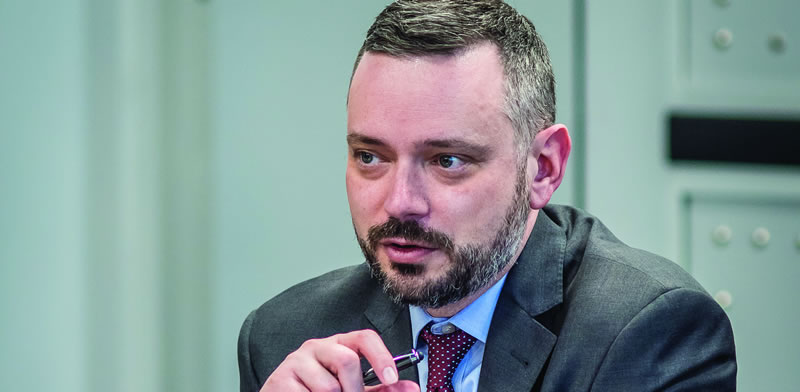Consumers have come to expect fast and efficient technology services whether they purchase an item online in mere seconds or watch a webcast without interruptions. This expectation is especially true of college students who rely on their devices and expect the same level of amenities when they enroll in traditional campus-based courses or participate in non-traditional learning environments. Meeting these high expectations is not for the weary.
The demand for exceptional technology services has helped Chief Information Officer Bradley Morton of Middlesex County College in Edison, NJ look for new ways to enhance academic and administrative IT support at his institution. His desire to understand current trends as well as future developments benefited the college in the development of a formal technology framework, which integrated information systems and business processes needed to succeed in today’s learning environment.

Morton comes from an engineering background and stepped into the position of CIO at Middlesex County College in 2014, after serving as the Chief Technology Officer at the College of Saint Elizabeth for over eleven years. He enjoys designing application solutions and IT architecture as well as being hands-on in other functional areas that use technology. He believes that the role of a CIO has transformed over the years with the evolving needs of institutions and growth in consumer and educational technology.
“I consider IT as its own business rather than just a support organization,” he said. “I view it as a business that provides solutions to the institution, and the members of the IT department are the consultants I entrust to deliver those solutions.”
An example of the technology shift at Middlesex County College is the commoditization of IT services for both academic and administrative IT areas. Middlesex County College transitioned from delivering some of the services themselves to using the software as a service model to host their learning management system as well as the CRM for Admissions. The IT department is developing a sustainable model for integrating cloud-hosted services with legacy information systems that are still on the premises.
“We have started to shift from the traditional, flat file ETL processes to common data models and real-time API calls,” Morton explained. “The focus of IT departments is moving away from supporting IT services to delivering technology solutions, which is an important distinction.”
This change in thinking has allowed Middlesex County College’s IT department to move away from directly supporting certain utility services and opened up time for the IT staff to partner with academic and administrative areas. Departments are able to improve their services and meet their strategic goals for their specific unit, freeing up resources to work on more impactful initiatives.
“I have increasingly found that I have to divest myself of IT operations responsibilities, so I’m spending less time focused internally within IT and spending more time working with the different business units and faculty,” Morton said. “I now routinely connect with them to gain an understanding of their needs, what their business demands entail and how we can use technology to help meet these goals rather than waiting for them to come to IT with a request.”
This integration switch improved the technology infrastructure and shifted the IT staff from running processes from a back room to a more public consulting role. The switch has given students more real-time interactions with the institution’s services.
“Students are used to dealing with the Googles and the Amazons of the world and, historically, when they entered the higher education environment they have often had to wait for services,” Morton said. “I believe these new trends are really pushing us in the direction of delivering services the way students expect them to be delivered. It also helps to have the right people lead some of these initiatives and start to foster the changes so we can be an IT organization that provides a more strategic and consultative approach.”
The Digital Transformation Trend
Digital transformation is another trend Morton and his staff have had to incorporate into their services. They are modernizing infrastructure and working on providing students with the self-service experience they have come to expect.
To keep up with the constantly changing technology trends in higher learning, CIOs are involved in planning from the beginning of the process, rather than at a later time. Morton stressed the importance of understanding the potential for innovative solutions sooner so services can be improved, better decisions can be made, and communication can become more effective and impactful.
“Advances in technology may yield opportunities for new or improved strategies, so having the CIO at the table during strategy planning helps institutions take advantage of these early opportunities,” he explained. “It means providing the business with meaningful and timely data with which to make informed decisions and guide strategy, and it also means transforming how we think about and approach higher education. That is the message we need to convey within our institutions.”
The New Jersey CIO Forum
Another area Morton has brought his technology expertise and leadership to is the New Jersey CIO Forum, where he served as the co-chair. This group has an intentional agenda that focuses on issues and strategic topics that resonate with the broad cross-section of CIOs from a variety of sectors. One recurring agenda item has been information security and keeping up with new threats. The group has also focused on regulatory compliance issues and looked for opportunities to reduce this burden at their institutions by using shared services and other collaborations. The CIO Forum is an excellent community for networking with new as well as more seasoned CIOs.
“If you are a CIO, this forum is a great opportunity to discuss issues, share lessons learned and work collaboratively to solve some of these common challenges we face,” Morton said. “Those who participate have opportunities to influence the agenda and can derive more value from the forum.”
An Innovative Example of Procurement at its Best
“One of the more recent services Edge has developed is the EdgeSecure solution. EdgeSecure provides security services to institutions that may not have the resources for dedicated security personnel,” Morton said. “I’m looking forward to seeing how this service can grow and what other services might be developed that can afford similar value.”
EdgeSecure provides insights into activity that takes place on an institution’s network and highlights vulnerabilities that may need to be addressed. Awareness of potential threats can also help meet audit requirements, which have become more stringent. EdgeSecure provides institutions with detailed reports that can serve as valuable touch points during annual reviews and the compliance process. The valuable information contained in reports can help cabinet and board members understand potential threats faced by their institutions.
“Information security receives increasing scrutiny in annual audits, and EdgeSecure can serve as one of the initial steps for many institutions as part of their security programs,” Morton said.
Partnering with Edge and being a part of the New Jersey CIO Forum has helped Morton become a better CIO for Middlesex County College. He has helped foster positive change and worked hard to create an IT department that provides solutions with a strategic and consultative approach.

